Advocacy Managers focus on building relationships with stakeholders and mobilizing supporters to influence policy and public opinion. Social Campaign Managers design and execute targeted campaigns across social media platforms to increase brand awareness and engagement. Both roles require strategic communication skills but differ in their primary objectives and target audiences.
Table of Comparison
| Feature | Advocacy Manager | Social Campaign Manager |
|---|---|---|
| Primary Role | Build and nurture brand advocates to amplify messaging | Plan and execute targeted social media campaigns |
| Key Focus | Advocate engagement, community building | Campaign strategy, audience targeting, performance tracking |
| Core Responsibilities | Recruit advocates, content sharing, relationship management | Content creation, ad management, analytics reporting |
| Success Metrics | Advocate activation rate, engagement levels | Reach, impressions, conversion rates |
| Tools Used | Advocacy platforms, community tools, CRM | Social media management, ad platforms, analytics software |
| Typical Outcomes | Enhanced brand loyalty, organic reach growth | Increased brand awareness, lead generation |
Overview: Advocacy Manager vs Social Campaign Manager
An Advocacy Manager drives community engagement and policy influence by building relationships with stakeholders and organizing grassroots campaigns that promote social causes. A Social Campaign Manager focuses on designing, executing, and analyzing digital marketing campaigns across social media platforms to increase brand awareness and user interaction. While both roles aim to mobilize audiences, the Advocacy Manager emphasizes strategic advocacy and public policy impact, whereas the Social Campaign Manager prioritizes targeted online engagement and content optimization.
Core Responsibilities Comparison
An Advocacy Manager primarily develops strategies to engage stakeholders and influence policy changes through grassroots mobilization and relationship building with key influencers. Social Campaign Managers focus on planning, executing, and analyzing digital marketing campaigns to increase brand awareness and drive audience engagement across social media platforms. Both roles require collaboration with cross-functional teams, but Advocacy Managers emphasize policy impact while Social Campaign Managers prioritize content performance and audience metrics.
Key Skills and Competencies
Advocacy Managers excel in stakeholder engagement, policy analysis, and strategic communication to influence public opinion and shape legislation effectively. Social Campaign Managers demonstrate expertise in digital marketing, audience targeting, and content creation to drive social media campaigns and maximize community impact. Both roles require strong project management, data analytics, and collaboration skills to achieve organizational goals and enhance social change initiatives.
Strategic Objectives and Impact
An Advocacy Manager develops targeted strategies to influence public policy and mobilize stakeholder engagement, focusing on long-term systemic change and measurable legislative outcomes. A Social Campaign Manager designs and executes digital campaigns aimed at raising brand awareness, driving community participation, and increasing social media engagement metrics. Both roles require strategic planning, but the Advocacy Manager prioritizes policy impact while the Social Campaign Manager emphasizes audience reach and behavior change.
Day-to-Day Operations
Advocacy Managers concentrate on building relationships with stakeholders, coordinating grassroots efforts, and mobilizing community support to influence policy change. Social Campaign Managers focus on designing, executing, and analyzing digital campaigns, managing content distribution, and optimizing engagement metrics across social media platforms. Both roles require collaboration with cross-functional teams but differ in operational emphasis: Advocacy Managers prioritize direct stakeholder engagement, while Social Campaign Managers prioritize digital audience targeting and campaign performance.
Stakeholder Engagement Approaches
Advocacy Managers prioritize building long-term relationships with policymakers, community leaders, and grassroots organizations to drive systemic change through sustained dialogue and targeted lobbying efforts. Social Campaign Managers focus on mobilizing wide audiences via digital platforms, leveraging influencer partnerships, and orchestrating viral content to maximize public visibility and engagement. Both roles employ data-driven strategies but differ in stakeholder interaction intensity, with Advocacy Managers emphasizing personalized engagement and Social Campaign Managers emphasizing broad outreach.
Measurement of Success
An Advocacy Manager measures success primarily through the growth and engagement of volunteer networks, policy influence, and tangible changes in legislation or corporate behavior. A Social Campaign Manager focuses on metrics such as social media reach, engagement rates, conversion rates, and ROI from digital campaigns. Both roles rely on data analytics but prioritize different outcome-based KPIs aligned with their strategic objectives.
Required Educational Background
Advocacy Managers typically hold degrees in political science, public relations, or communications, emphasizing skills in public policy and community organizing. Social Campaign Managers often have educational backgrounds in marketing, social media, or digital communications, focusing on brand promotion and audience engagement strategies. Both roles benefit from coursework in media studies and strategic communication to effectively influence public opinion and drive social change.
Career Pathways and Progression
Advocacy Managers typically advance by deepening expertise in policy development and stakeholder engagement, progressing towards roles like Policy Director or Corporate Affairs Lead. Social Campaign Managers often follow a trajectory that emphasizes digital marketing and data analytics skills, leading to positions such as Digital Marketing Director or Chief Marketing Officer. Both career pathways demand strategic leadership and effective communication, but Advocacy Managers focus more on influencing regulations while Social Campaign Managers drive consumer engagement and brand awareness.
Challenges and Opportunities in Each Role
Advocacy Managers face challenges in mobilizing grassroots support and influencing policy amidst diverse stakeholder interests, while leveraging opportunities to build long-term alliances and drive systemic change through strategic messaging. Social Campaign Managers encounter the complexity of managing fast-paced digital campaigns and optimizing engagement metrics, gaining opportunities to harness data analytics and innovative platforms for targeted outreach. Both roles demand adaptability and deep audience insights to successfully navigate evolving social landscapes and maximize impact.
Advocacy Manager vs Social Campaign Manager Infographic

 jobdiv.com
jobdiv.com